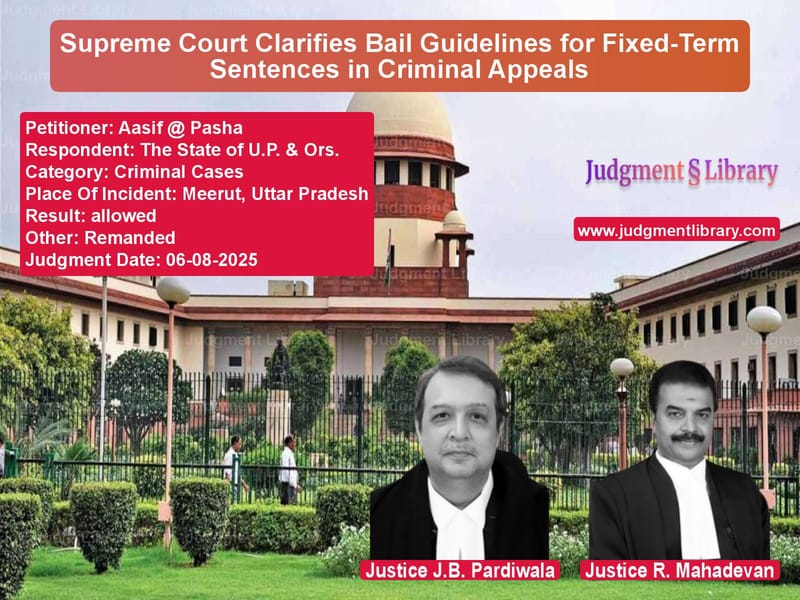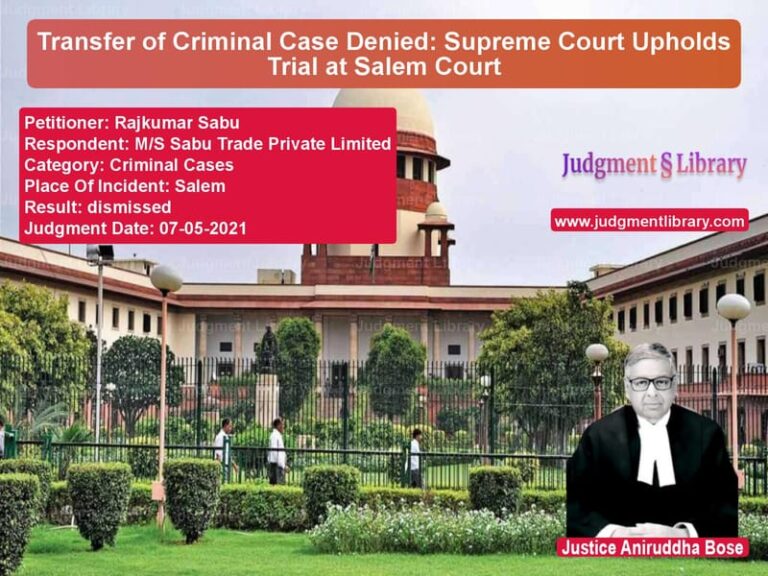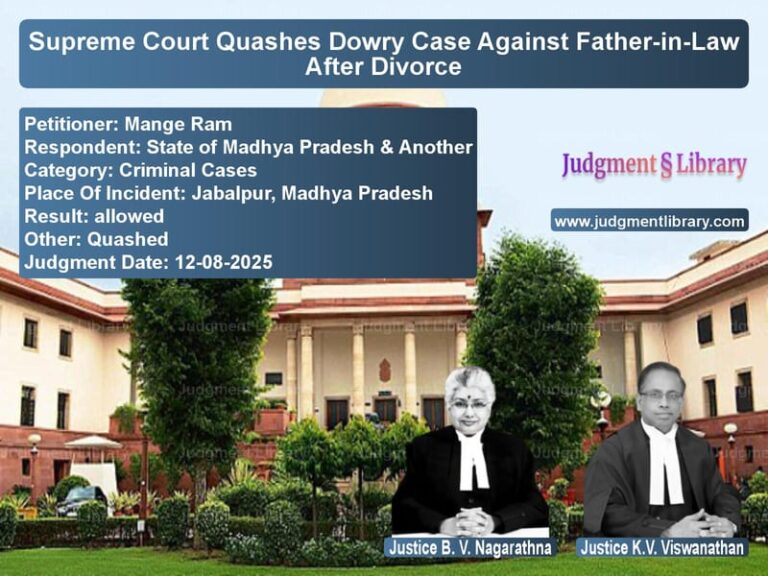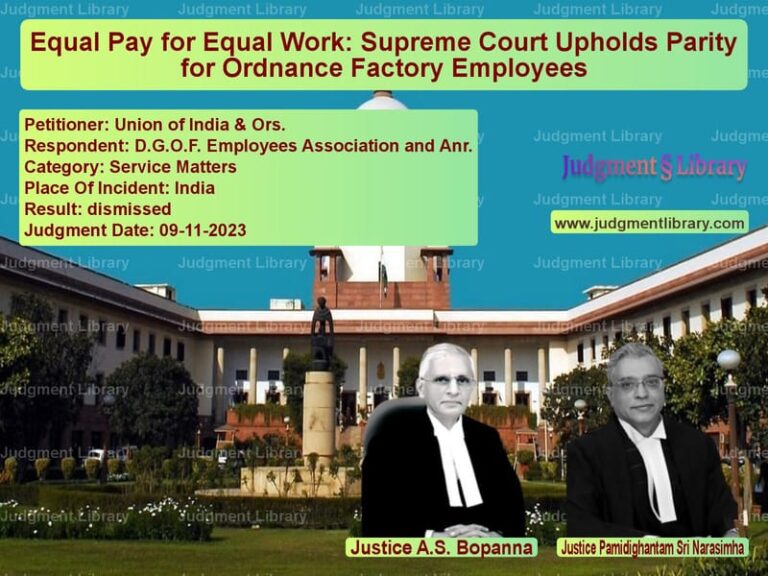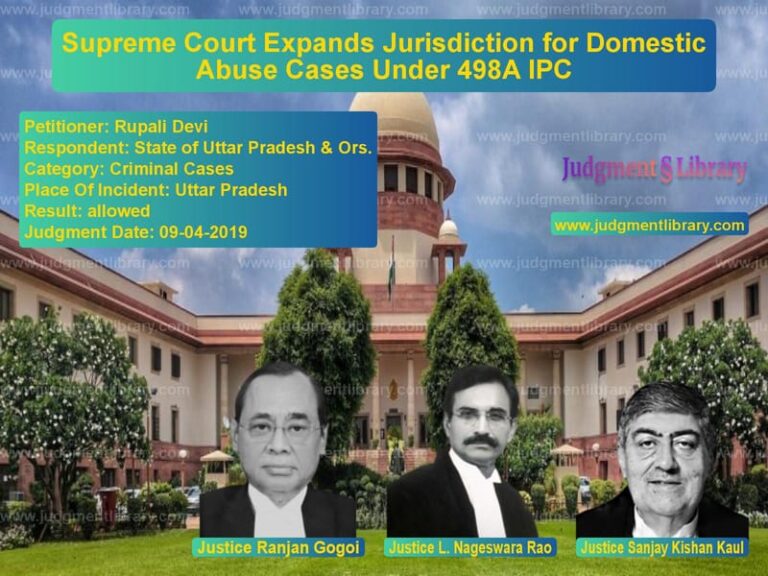Supreme Court Clarifies Bail Guidelines for Fixed-Term Sentences in Criminal Appeals
In a significant ruling that addresses the delicate balance between judicial discretion and the rights of convicted persons, the Supreme Court of India recently provided crucial clarification on when courts should suspend sentences during criminal appeals. The case involving Aasif @ Pasha, who had been convicted under multiple laws including the POCSO Act and SC/ST Prevention of Atrocities Act, became the platform for the Court to reiterate fundamental principles that protect the meaningful right to appeal, especially in cases involving fixed-term sentences.
The legal journey began when Aasif @ Pasha was convicted by the 2nd Additional Sessions Judge/Special Judge (POCSO Act) in Meerut, Uttar Pradesh. The trial court found him guilty of offenses under Sections 7 and 8 of the POCSO Act, Sections 354, 354Kha, 323, and 504 of the Indian Penal Code, and Section 3(1)(10) of the Scheduled Castes and Scheduled Tribes (Prevention of Atrocities) Act, 1989. The court sentenced him to varying prison terms, with the maximum being four years of rigorous imprisonment for the POCSO and SC/ST Act offenses, and ordered that all sentences run concurrently.
Dissatisfied with the conviction, Aasif filed an appeal before the Allahabad High Court. While his main appeal awaited hearing, he applied for suspension of his sentence under Section 389 of the Code of Criminal Procedure. This provision allows appellate courts to suspend sentences during the pendency of appeals. However, the High Court declined his application, observing that “the applicant/appellant has been held to be guilty of committing the offence which is not only immoral but also heinous, therefore, this Court does not find any good or sufficient ground so as to enlarge the applicant/appellant on bail during the pendency of present appeal.”
The Supreme Court, comprising Justices J.B. Pardiwala and R. Mahadevan, began its analysis with a stark observation: “The impugned Order is one more from the High Court of Judicature at Allahabad with which we are disappointed.” This opening remark signaled the Court’s concern about what it perceived as a recurring pattern of judicial approach that needed correction.
The Court drew a fundamental distinction between two types of sentences: fixed-term sentences and life imprisonment. It emphasized that “when a convicted person is sentenced to a fixed period of sentence and when he files an appeal under any statutory right, suspension of sentence should be considered by the Appellate Court liberally unless there are exceptional circumstances.” This principle, established in the 1999 case of Bhagwan Rama Shinde Gosai v. State of Gujarat, formed the bedrock of the Court’s reasoning.
The Supreme Court explained the practical reality that drives this liberal approach: “But if for any reason the sentence of a limited duration cannot be suspended, every endeavour should be made to dispose of the appeal on merits, more so when a motion for expeditious hearing of the appeal is made in such cases.” The Court highlighted the grave consequence of delayed appeals in fixed-term sentence cases: “This Court said in so many words that otherwise the very valuable right of the appellant would be an exercise in futility by afflux of time.”
The judgment provided crucial guidance on when appellate courts should prioritize sentence suspension: “When the Appellate Court finds that due to practical reasons, such appeals cannot be disposed of expeditiously, the Appellate Court must show special concern in the matter of suspending the sentence so as to make the appeal right, meaningful and effective.”
Read also: https://judgmentlibrary.com/supreme-court-reinstates-murder-conviction-in-bihar-fire-tragedy-case/
However, the Court was careful to distinguish between fixed-term sentences and more serious offenses. It referenced its earlier decision in Omprakash Sahni v. Jai Shankar Chaudhary, which dealt with life imprisonment cases: “In cases involving conviction under Section 302 IPC, it is only in exceptional cases that the benefit of suspension of sentence can be granted.” The Court quoted extensively from Kishori Lal v. Rupa, which had outlined the careful consideration required: “Section 389 of the Code deals with suspension of execution of sentence pending the appeal and release of the appellant on bail. There is a distinction between bail and suspension of sentence. One of the essential ingredients of Section 389 is the requirement for the appellate court to record reasons in writing for ordering suspension of the execution of the sentence or order appealed against.”
The Court further elaborated on the approach for serious offenses: “In considering the prayer for bail in a case involving a serious offence like murder punishable under Section 302 IPC, the court should consider the relevant factors like the nature of accusation made against the accused, the manner in which the crime is alleged to have been committed, the gravity of the offence, and the desirability of releasing the accused on bail after they have been convicted for committing the serious offence of murder.”
Returning to the specific case before them, the Supreme Court found that the High Court had adopted an incorrect approach. “It is unfortunate that the High Court while passing the impugned order failed to take into consideration the well-settled principles of law governing the plea of suspension of sentence on fixed term is concerned. What the High Court did was to reiterate the entire case of the prosecution and the oral evidence which has come on record. That is not the correct approach.”
The Court emphasized the practical implications of delayed justice in fixed-term sentence cases: “The High Court should have been mindful of the fact that the appeal is of the year 2024. Appeal of 2024 is not likely to be taken up in near future. Ultimately, if 4 years are to elapse in jail the same would render the appeal infructuous and that would be travesty of justice.”
This observation highlights a critical concern in India’s criminal justice system – the significant delays in hearing appeals, which can effectively deny justice to those with shorter sentences by having them complete their punishment before their appeals are even heard.
The Supreme Court set aside the High Court’s order and remanded the matter for fresh consideration, providing clear guidance: “The High Court shall keep in mind that the sentence is for a fixed term, i.e. 4 years and it is only if there are any compelling circumstances on record to indicate that the release of the appellant would not be in public interest that the Court may order accordingly.”
The Court also took the opportunity to offer broader guidance to lower courts: “We are once again constrained to observe that such errors creep in at the level of High Court and only because the well-settled principles of law on the subject are not applied correctly. It is very important to first look into the subject-matter. Thereafter the court should look into the issue involved. In the last the court should look into the plea of the litigant and then proceed to apply the correct principles of law.”
The Supreme Court directed the High Court to rehear the application within fifteen days, ensuring that the appellant’s rights would be considered promptly. This timeframe reflects the Court’s recognition of the urgency in such matters, where every day of delay potentially eats into the meaningful exercise of appellate rights.
This judgment serves as an important reminder of the judiciary’s role in balancing competing interests – the state’s interest in enforcing criminal sentences against an individual’s right to meaningful appellate review. By clarifying that fixed-term sentences should generally be suspended during appeals (absent exceptional circumstances), the Supreme Court has protected the substance of the right to appeal for thousands of convicted persons who might otherwise serve their entire sentences before their appeals are decided.
The decision also demonstrates the Supreme Court’s role in supervising lower courts and ensuring consistent application of legal principles across the country. By explicitly expressing disappointment with the High Court’s approach and providing detailed guidance, the Court has reinforced the importance of judicial discipline and adherence to established precedents.
This ruling will likely have far-reaching implications for criminal appeals across India, particularly in cases involving shorter sentences where the delay in hearing appeals could effectively nullify the right to appeal. It reaffirms the principle that legal rights must be practical and meaningful, not just theoretical, and that courts have a responsibility to ensure that procedural delays do not undermine substantive justice.
Petitioner Name: Aasif @ Pasha.Respondent Name: The State of U.P. & Ors..Judgment By: Justice J.B. Pardiwala, Justice R. Mahadevan.Place Of Incident: Meerut, Uttar Pradesh.Judgment Date: 06-08-2025.Result: allowed.
Don’t miss out on the full details! Download the complete judgment in PDF format below and gain valuable insights instantly!
Download Judgment: aasif-@-pasha-vs-the-state-of-u.p.-&-supreme-court-of-india-judgment-dated-06-08-2025.pdf
Directly Download Judgment: Directly download this Judgment
See all petitions in Bail and Anticipatory Bail
See all petitions in SC/ST Act Case
See all petitions in Judgment by J.B. Pardiwala
See all petitions in Judgment by R. Mahadevan
See all petitions in allowed
See all petitions in Remanded
See all petitions in supreme court of India judgments August 2025
See all petitions in 2025 judgments
See all posts in Criminal Cases Category
See all allowed petitions in Criminal Cases Category
See all Dismissed petitions in Criminal Cases Category
See all partially allowed petitions in Criminal Cases Category

